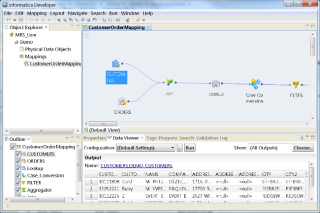Cómo instalar Blacklistd en FreeBSD 11.1
Introducción Cualquier servicio que esté conectado a Internet es un objetivo potencial para ataques de fuerza bruta o acceso injustificado. Hay herramientas como fail2ba
The purpose of this guide is to show you how easy it is to make a homepage for your website on Vultr with OpenBSD and httpd.
Head over to https://my.vultr.com/deploy/. This is the main page for deploying new servers. However, before installing anything on your server, we must first create it. Thankfully, Vultr has made this process very easy:
64bit" and then "OpenBSD".My-Website-01.After checking the summary at the bottom of the page and making sure everything is correct, click the Deploy Now button. Allow a minute or two for the server to be created. Afterwards you will be redirected to a new page that shows the status of all your servers.
Once the status tab turns green on the newly created server, everything is up and running. Click the manage link next to it and you will be taken to the server information page. You will see Server Information (My-Website-01) at the top of the page. From here you can manage the server and view the root password by clicking the eye icon.
Next you should record the IP address assigned to your server and point your DNS records at it. You can read more about how to do this here.
Open up your SSH program and connect to your server as root. Please note that this is heavily frowned upon so we will only be doing this once in order to create a non-root user with elevated privileges. Once you have connected to your server over SSH, make an account for yourself. To do this enter adduser into the terminal. You will now be prompted with several questions about the new account. The only two things you are required fill out are your username and password. The rest of the questions are optional.
After making the account, the final thing that must be done is enabling elevated privileges for it. While you are still logged in as root, enter the following into the terminal:
user mod -G wheel username
This will place your account in the wheel group, allowing you to act as root.
We are now finished with creating your account. Exit the server and reconnect with your new account. The first thing you should do is enter su into the terminal. You will be asked the password for the root account.
Now we need to make a directory for your website:
mkdir -p /var/www/htdocs/yourwebsite.com
Let's make the configuration file:
vi /etc/httpd.conf
Type the following into the file:
# Main Configuration
server "yourwebsite.com" {
listen on * port 80
root "/htdocs/yourwebsite.com"
}
# This is a redirect to the Main Configuration
server "www.yourwebsite.com" {
listen on * port 80
block return 301 "http://yourwebsite.com$REQUEST_URI"
}
Save and exit.
Go ahead and make sure everything is working:
httpd -n
You will see httpd(ok). This indicates that everything is working.
The final two things we need to do for httpd is enable it, and then start it.
Enable httpd:
rcctl enable httpd
Start httpd:
rcctl start httpd
You will now be able to access your website over the internet, however you will get a 403 status code because there's nothing in the website directory. Let's change that.
Create your homepage by typing the following:
vi /var/www/htdocs/yourwebsite.com/index.html
Populate it with the following:
<!DOCTYPE html>
<html>
<head>
<title>Hello World</title>
</head>
<body>
<p>Welcome to my OpenBSD server on Vultr!</p>
</body>
</html>
Save and exit, and you have successfully created your first website on OpenBSD.
Introducción Cualquier servicio que esté conectado a Internet es un objetivo potencial para ataques de fuerza bruta o acceso injustificado. Hay herramientas como fail2ba
Introduction A FAMP stack, which is comparable to a LAMP stack on Linux, is a collection of open-source software that is typically installed together t
Este tutorial le mostrará cómo configurar OpenBSD 5.6 con un disco completamente encriptado en su Vultr VPS. Una nota sobre la parte de cifrado: la mayoría de los centros de datos alrededor de
Usar un usuario sudo para acceder a un servidor y ejecutar comandos a nivel raíz es una práctica muy común entre Linux y Unix Systems Administrator. El uso de un sud
¿Usando un sistema diferente? osTicket es un sistema de tickets de soporte al cliente de código abierto. El código fuente de osTicket está alojado públicamente en Github. En este tutorial
Using a Different System? Osclass is an open source project that allows you to easily create a classified site without any technical knowledge. Its sourc
Using a Different System? Wiki.js is a free and open source, modern wiki app built on Node.js, MongoDB, Git and Markdown. Wiki.js source code is publicl
Using a Different System? Lychee 3.1 Photo Album is a simple and flexible, free and open source photo-management tool which runs on a VPS server. It install
Using a Different System? Fork is an open source CMS written in PHP. Forks source code is hosted on GitHub. This guide will show you how to install Fork CM
Fuera de la caja, los servidores Vultr FreeBSD no están configurados para incluir espacio de intercambio. Si su intención es una instancia de nube desechable, probablemente no necesite
El sistema operativo FreeBSD utiliza UFS (Sistema de archivos Unix) para su sistema de archivos de particiones raíz; también conocido como freebsd-ufs en caso de una actualización
Using a Different System? Selfoss RSS Reader is a free and open source self-hosted web-based multipurpose, live stream, mashup, news feed (RSS/Atom) reade
Using a Different System? Matomo (formerly Piwik) is an open source analytics platform, an open alternative to Google Analytics. Matomo source is hosted o
Using a Different System? TLS 1.3 is a version of the Transport Layer Security (TLS) protocol that was published in 2018 as a proposed standard in RFC 8446
Using a Different System? Introduction Craft CMS is an open source CMS written in PHP. Craft CMS source code is hosted on GitHub. This guide will show yo
¿Usando un sistema diferente? Backdrop CMS 1.8.0 es un sistema de administración de contenido (CMS) simple y flexible, amigable para dispositivos móviles, gratuito y de código abierto que nos permite
¿Usando un sistema diferente? ImpressPages CMS 5.0 es un sistema de gestión de contenido (CMS) simple y efectivo, gratuito y de código abierto, fácil de usar y basado en MVC
Using a Different System? NodeBB is a Node.js based forum software. It utilizes web sockets for instant interactions and real-time notifications. The NodeB
Using a Different System? ESpeak can generate text-to-speech (TTS) audio files. These can be useful for many reasons, such as creating your own Turin
¿Usando un sistema diferente? TaskWarrior es una herramienta de gestión de tiempo de código abierto que es una mejora en la aplicación Todo.txt y sus clones. Debido a th
ZPanel, un panel de control de alojamiento web popular, se bifurcó en 2014 a un nuevo proyecto llamado Sentora. Aprende a instalar Sentora en tu servidor con este tutorial.
Aprende cómo instalar Vtiger CRM, una aplicación de gestión de relaciones con el cliente, en CentOS 7 para aumentar tus ventas y mejorar el servicio al cliente.
Esta guía completa le mostrará cómo configurar un servidor Counter-Strike 1.6 en Linux, optimizando el rendimiento y la seguridad para el mejor juego. Aprende los pasos más recientes aquí.
Los ataques de ransomware van en aumento, pero ¿puede la IA ayudar a lidiar con el último virus informático? ¿Es la IA la respuesta? Lea aquí, sepa que la IA es una bendición o una perdición
ReactOS, un sistema operativo de código abierto y gratuito, está aquí con la última versión. ¿Puede satisfacer las necesidades de los usuarios de Windows de hoy en día y acabar con Microsoft? Averigüemos más sobre este estilo antiguo, pero una experiencia de sistema operativo más nueva.
Whatsapp finalmente lanzó la aplicación de escritorio para usuarios de Mac y Windows. Ahora puede acceder a Whatsapp desde Windows o Mac fácilmente. Disponible para Windows 8+ y Mac OS 10.9+
Lea esto para saber cómo la Inteligencia Artificial se está volviendo popular entre las empresas de pequeña escala y cómo está aumentando las probabilidades de hacerlas crecer y dar ventaja a sus competidores.
Recientemente, Apple lanzó macOS Catalina 10.15.4, una actualización complementaria para solucionar problemas, pero parece que la actualización está causando más problemas que conducen al bloqueo de las máquinas Mac. Lee este artículo para obtener más información
13 Herramientas comerciales de extracción de datos de Big Data
Nuestra computadora almacena todos los datos de una manera organizada conocida como sistema de archivos de diario. Es un método eficiente que permite a la computadora buscar y mostrar archivos tan pronto como presiona buscar.






